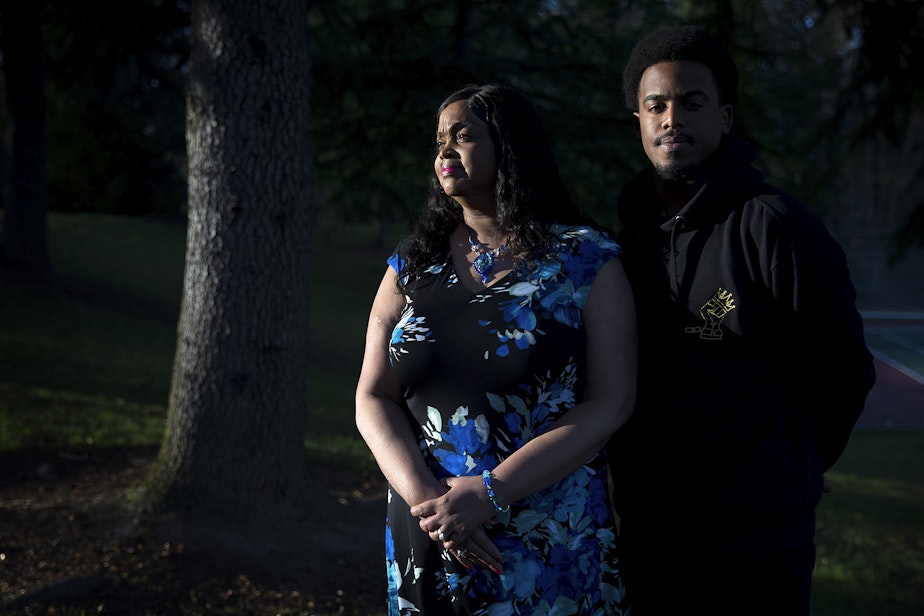Police neck restraints now banned in many Seattle suburbs

Protests were the catalyst for change, police chiefs say.
Neck restraints – or chokeholds, as they are often referred to by the public – have recently been banned in many police departments across the Seattle area.
Notably, they have been banned in suburbs of south Seattle, in south King County, which has a high Black and brown population. Police chiefs in this area confer with each other, and on a recent call earlier this summer agreed they should end the use of neck restraints.
Commander Kurt Schwan of the Federal Way Police Department called the policy shift “a social change.”
Schwan said Federal Way made the change after listening to the community. because it’s what the community wanted. The changes come on the heels of protests launched after the death of George Floyd in Minneapolis, who was killed when a police officer kneeled on his neck.
Departments that recently banned neck restraints also include Bellevue, Tukwila, Kent, Renton and, Lynnwood. Banning chokeholds is part of the 8 Can’t Wait movement, a platform that includes eight ways to reduce police violence.
Sponsored
Federal Way had used neck restraints 40 times in recent years, and as recently as May, Schwan said.
“There were no reported injuries, no reported deaths. It is one of the most effective tools we use that limits” escalation, he said. “However, due to the social environment that we are in, and we are part of the community, and the community does not want that used against their members.”
Neck restraints, when they are applied as intended, render someone unconscious.
Federal Way recently paid out an expensive lawsuit, north of half a million dollars, to Josiah Hunter, a young man who was placed in a neck restraint in 2014. Hunter had been at a gas station with a friend when they witnessed a car accident, and went to clean up debris from the scene.
An officer who arrived later said he believed that Hunter was making trouble, according to court records, and said that Hunter’s “defiant” smile was part of the reason he placed him in a chokehold.
Sponsored
Kris Durell, the officer who put Hunter in a neck hold, had placed 13 people in a neck hold between 2012 and 2018. Nine were rendered unconscious.
Read: Their smiles were defiant. A cop puts a young Black man in a chokehold
After the 2014 incident, Sanetta Hunter, Josiah’s mother, started attending Federal Way City Council meetings to speak out against neck restraints.
Josiah Hunter sued Federal Way and won his case this year. He received his check on May 28, and a week or so later, the south King County police chiefs started talking about banning the neck restraints.
The policy went into effect on June 24 in Federal Way, and Sanetta Hunter believes her son’s case influenced the decision. “Naturally they don’t want to have to write those kinds of checks,” she said. “If that’s what it took, so be it. As long as it got to it.”
Sponsored
Commander Schwan said the Hunter case didn’t factor into the decision.
But he agreed with Sanetta Hunter that state reforms on neck restraints were likely coming soon. “Most people see the writing on the wall,” he said. “There’s no point in waiting for the state Legislature to tell us what to do.”
Sanetta Hunter was recently appointed to Gov. Jay Inslee’s policing task force, along with a cousin of Charleena Lyles, who was killed by police in her Seattle apartment, and Andre Taylor, whose brother was also killed by Seattle police.
In nearby Kent, Commander Robert Hollis said the chiefs in south King County tend to be in lockstep about policies.
“Our chiefs will often discuss contemporary issues that affect us in the south King County area,” Hollis said. “Our agencies work very closely together; we make sure we do things that are for the most part very similar.”
Sponsored
Kent ended its use of neck restraints in late July.
The King County Sheriff’s Office and Seattle Police Department had banned neck restraints long prior to the protests, categorizing them as a lethal use of force on par with using a gun.
Further north, in Everett, Officer Aaron Snell said the department hasn’t used neck restraints for a long time. “I’ve never learned, and I’ve been here 16 years,” he said.

